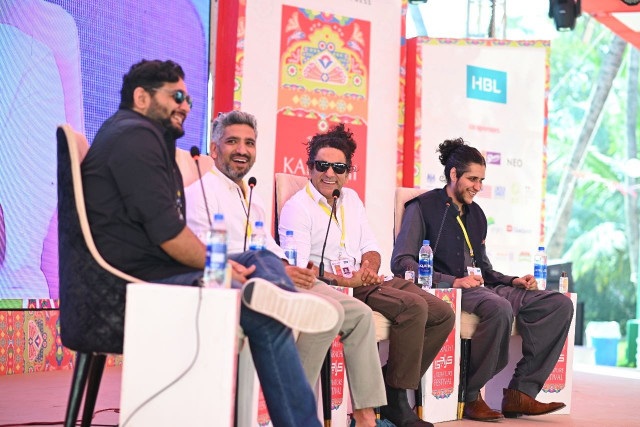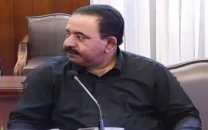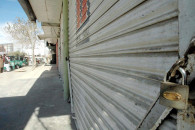Satire in the age of censorship
'Banana Boys' leave audience in stitches at Karachi Literature Festival

With tolerance for dissent on the wane, even satirists and comedians have to face the consequences if they ‘cross the line’. This was the consensus at a session featuring satirists Mustafa Chaudhry and Murtaza Chaudhry, and their writer Faysal Chaudhry of the 4-Man Show and Banana News Network fame.
The session, aptly titled ‘Hum sangeen mazaak kee lapait main hain” (We are caught up in a serious joke), was moderated by comedian Shehzad Ghias Shaikh on day two of the Karachi Literature Festival (KLF) on Saturday.
The session started a bit late but the moderator and guests quickly warmed up the audience with a few jokes, including one on putting up Tim Hortons banners to attract people. It quickly moved on to politics, with the satirists pointing out that the talk-show circuit and statement by notable personalities provided an abundance of content. “This has been especially true since 2018,” Murtaza quipped.
The trio discussed how they came up with the term ‘Imran-do’, which has since become popular with regards to over-enthusiastic supporters of Imran Khan.
The discussion moved to how satirists handle abuse directed at them on social media. The consensus was to develop a thick skin. “You can also give them as good as you get and then blame it on hackers,” Mustafa said.
They talked about their beginnings and the evolution of political satire in the country. Satire provides an alternative to the content-heavy talk-shows. It provides information and ideas - often in a language - that resonates with the younger audiences, Faysal pointed out.
The panel explored the boundaries of satire, and the many ‘holy cows’ that mainstream media is often compelled to pander to. “There are other no-go areas like religion and judiciary, but when it comes to political satire, there is a lot that one can do,” Murtaza said.
However, some politicians are more sensitive than others. “There are red-lines, and then there are white lines,” said the comedians with the not-so-cryptic remarked lapped up by the audience.
Documentary screening
A short film titled, ‘Life in the Kalasha Valley’, by Sualeha Qureshi won the first prize at an awards ceremony for aspiring filmmakers. The runner-up was ‘Land of Maahigir’ by Hasan Sidiqqui. The winning films were screened in front of a live audience, followed by a panel discussion on the theme of ‘Unearthing Cultures of Pakistan.’
The festival saw comparatively low turnout than previous years on its second day, with organisers saying that it had to do with Friday’s terror attack in the city. Harris Khalique, a literary figure and the organiser, acknowledged that the footfall was low but lauded the nature of questions and engagement that the speakers had with the audience.
Published in The Express Tribune, February 19th, 2023.



















COMMENTS
Comments are moderated and generally will be posted if they are on-topic and not abusive.
For more information, please see our Comments FAQ